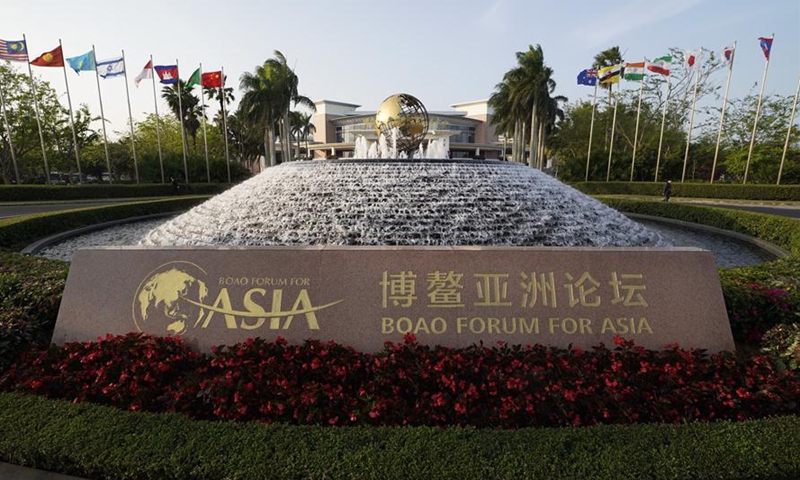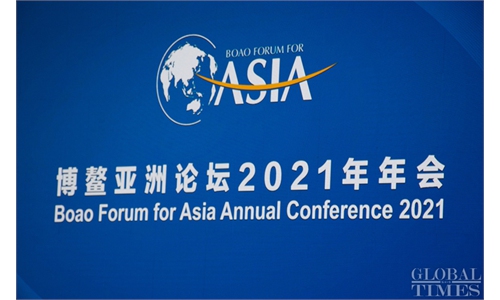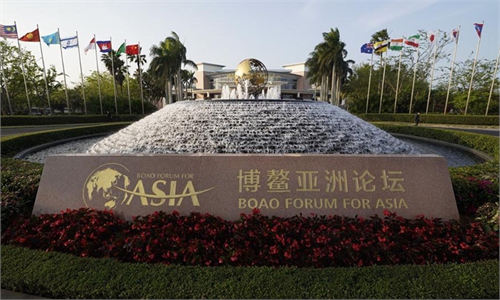Unified legal, tax systems called for GBA
Guangdong, Hong Kong, Macao to be closely integrated for growth

The Boao International Conference Center in Boao, south China's Hainan Province. (File photo: Xinhua)
Institutional reform is crucial for the development of the Guangdong-Hong Kong-Macao Greater Bay Area (GBA), with unified laws, tax policies and free exchanges of people and goods, city heads and experts said at a discussion panel about the GBA's development at the Boao Forum for Asia.
The panel discussed how GBA cities can convert the region into a global highland of tech innovation and a hub for emerging industries while realizing synchronized development within the cluster.
Consisting of China's most innovative cities, the Guangdong-Hong Kong-Macao GBA is expected to become a world-class urban cluster, said Edmund Ho Hau-wah, vice chairperson of the 13th Chinese People's Political Consultative Conference (CPPCC) National Committee.
Hong Kong has technology and fundamental research power, but it lacks a large market and significant manufacturing ability. The Guangdong-Hong Kong-Macao GBA, with a massive market and strong production ability, perfectly settles the problem for Hong Kong, Carrie Lam, chief executive of the Hong Kong Special Administrative Region, told the forum on Tuesday.
Lam noted that challenges persist for the better integration of the region. For instance, how to make the elements of technological innovation be circulated among the three areas, and how can more experts and professionals be attracted to the region?
"In the past two years, some Western countries have not been friendly to China. Therefore, we are focused on attracting experts who have developed overseas back to Hong Kong and the Guangdong-Hong Kong-Macao Greater Bay Area," Lam said.
For the GBA to develop, barriers on exchanges of personnel and information must be removed, and tax policies and laws must be unified.
Economic laws should be based on lessons learned from Hong Kong, whose laws are the most widely recognized in the world within the GBA. The current level of tax and legal coordination in the area is inadequate, said Li Ruogu, chairman of the China International Economic Relations Association.
Li told the Global Times after the panel discussion that the GBA's development requires institutional overhaul.
"The 29 countries of the EU can all break legal barriers and have barrier-free exchanges of people and goods. We are one country, why can't we unify the laws? We still need license plates and visas within the GBA area, which are obstacles to economic and social development," Li noted.
Guo Yonghang, Party Secretary of the CPC of Zhuhai city, agreed with Li and said at the Tuesday panel that with two systems, three customs territories, three currencies and three legal systems, it seems that the institutional gaps are greater than the physical gaps.
"What is most urgent now is the soft connectivity of institutions, which seems to be the most difficult part, but we must make breakthroughs. Otherwise, it will not be easy for the GBA to be interconnected. I believe the central government attaches great importance to this," Guo added.
Guo noted that Hengqin and Macao will take the lead to test institutional integration, which will also inspire and promote the prosperity and development of other cities in the GBA area.
Hengqin, also a free trade zone, is an island in the city of Zhuhai, South China's Guangdong Province.
What Macao has lacked is space, which has restricted the development of its industry, but this gap can be filled and supported by Hengqin, said Lei Wai-nong, secretary for economy and finance of the Government of the Macao Special Administrative Region.
Lin Yifu, dean and professor at the Institute of New Structural Economics of Peking University, said the GBA has advantages and potential in capital, talent, manufacturing capability and the market.
Lin called for efforts to combine these advantages in different areas in the region, forming the world's most competitive technological innovation highland and a source of emerging industries, which can lead global economic development.
The future development of the GBA is not only about "sharing a boat out to sea, but also about riding the wind and waves, and traveling steadily and far," said Lam.
Based on the development experience of Tokyo Bay, Tomoo Marukawa, professor of Chinese economy at the Institute of Social Science, University of Tokyo, suggested that the GBA should build more intro-city railways and commute facilities.



